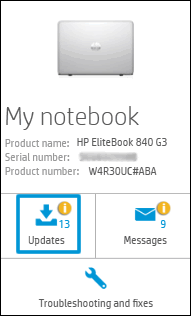-
×InformationNeed Windows 11 help?Check documents on compatibility, FAQs, upgrade information and available fixes.
Windows 11 Support Center. -
-
×InformationNeed Windows 11 help?Check documents on compatibility, FAQs, upgrade information and available fixes.
Windows 11 Support Center. -
- HP Community
- Gaming
- Gaming Notebooks
- Slow Gaming Laptop Out of the Box

Create an account on the HP Community to personalize your profile and ask a question
11-25-2022 11:32 AM
Hello, all,
So I got my HP Pavilion Gaming Laptop in 2019, and right away it was really slow. The main reason I got it was because I didn't want to get a desktop pc- but due to this laptop being super slow I ended up getting a desktop pc anyway. To this day, this laptop is really slow. For example: I start up my laptop and put in my pin to sign in, and the numbers take a few seconds to load in. Then, it takes a minute or two for the taskbar to load with my apps. Also, if I click on an app, it takes several minutes before it launches, and often I have to click on it multiple times before it loads. I've tried driver updates, system updates, computer cleaning- I don't know what else to try. I can't play any games because it takes forever to boot up whatever games I want to play, and often times my games are really skippy even though my fps is good. I'm not sure what to do. Help?
11-29-2022 07:00 AM
@isab000
Welcome to the HP support community.
I understand that you are getting a slow performance issue, I am glad to assist you.
Update the Bios, chipset, and drivers using HP Support Assistant.
Download and run the HP Support Assistant from this Link: Click here
- HPSA will automatically search for all the latest drivers for your Notebook
- Click My devices in the top menu, and then click Updates in the My PC or My notebook pane.

- Click Check for updates and messages to scan for new updates.

- Review the list of updates. Updates with a yellow information icon are recommended. Updates with a blue information icon are optional.
- Click the update name for a description, version number, and file size.
- Select the box next to any updates you want to install, and then click Download and install.
Also, ensure Windows is up to date.
- Select the Start button, and then go to Settings > Update & security > Windows Update , and select Check for updates. If Windows Update says your device is up to date, you have all the updates that are currently available
Let me know how it goes.
To thank me for my efforts to help you, please mark my post as an accepted solution so that it benefits several others.
Cheers.
Sandytechy20
I am an HP Employee
11-30-2022 09:56 PM
I get a 404 Error when I click on that first link. But either way, I updated my bios, and drivers and Windows ware already up to date. It’s definitely a little better but that’s all. Just a little. It’s still takes a while to load anything. I opened task manager and my gpu and cpu said there were around 50% usage, then they would go low and my memory would jump to 70%+.
12-01-2022 02:04 AM
Mine was slower than I expected out of the box. There are many setting you can change in windows that hog resources. I searched google for Windows settings to increase speed. There are many settings to "improve" user experience that really only have to do with visual affects to make windows look nicer, things like slowly opening windows instead of popping them up instantly and clear border around windows so you can see through them. (WTH, it adds a wide border then make it transparent so you can see thru it.) I didn't want any of that stuff I only cared about speed performance. Those suggestions helped me. Second, new computers come with lots of extra programs and "bloatware". I went to the install/uninstall in settings and uninstalled everything I didn't use. You can also search for unnecessary programs on the internet. If you don't know what a program is, search for it on the internet. Finally, use task manager and see how much stuff is in the startup menu. You can change the start-up status to disabled for stuff you don't need to start-up until you use it. It doesn't affect any software on your machine it only stops the software from starting and sitting in an idle mode. When you actually use the software it might take a couple of seconds longer for the program to start but the cost to me is far better than consuming system resources. After making all the changes I would say the speed improvement was about double. Not sure if any of this is going to make your machine as fast as you need as it sounds like it has serious issues but I hope it helps. I think it would be a miracle if installing new drivers, updating the BIOS, and updating windows fixed your problem, but there is always hope.
